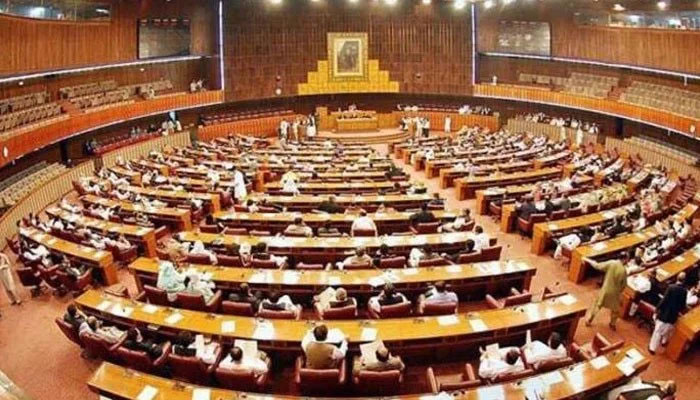In opposition’s absence: NSA’s briefing to MPs panel to be one-sided, lacking critical queries
ISLAMABAD: The presentation of national security policy in a parliamentary committee and ensuing meaningful discussion on the topic will remain a one-sided affair if it is confined to the ruling coalition only in the absence of the opposition parties.
Speaker Asad Qaiser heads the parliamentary committee on national security, which will hold an in-camera session on Monday. It was officially stated that the National Security Adviser Moeed W Yusuf will give the presentation.
All the opposition parties have jointly announced that they will boycott the forum in protest against what they described as the “dictatorial attitude” of the government. They accused the government of riding roughshod over the Constitution and making parliament a rubber stamp.
They said the briefing would merely provide the government another chance to put up a show that would have nothing to do with the critical issues facing the country and the people or providing solutions to those problems.
Reacting to this decision, Information Minister Fawad Chaudhry had urged the opposition parties to review their decision and show a responsible attitude as the government was facilitating them by giving them a briefing on national security issues.
There is a long list of invitees to the meeting. They include not only the top leaders of the opposition parties but also several of their MPs. Apart from the 29 notified members of the committee, many other lawmakers have also been invited to the meeting.
One list of special invitees consists of 22 legislators and six federal secretaries. Then there are 41 “additional special invitees”. Altogether, there will be more than a hundred participants in the session, which will lose its value due to the absence of the opposition MPs who would have given the other side of the story on national security had they attended. Primarily, such briefings are held for the opposition parties. The chief ministers of the four provinces, Azad Kashmir and Gilgit-Baltistan have also been invited.
The opposition is apparently irked over the government’s decision to send the unelected Moeed Yusuf to give the briefing. The opposition parties described Moeed Yusuf as merely a showpiece and said that neither the NSA had the relevant information nor the authority to take any decisions, and his briefing would not have anything to do with the real factors and future blueprints.
In the past, the parliamentary forum had been briefed by top military and intelligence officials more than once. Useful question-answer sessions had also followed. The opposition parties had attended all such events. There is no mention in the official notice issued bythe National Assembly Secretariat that Prime Minister Imran Khan would attend the briefing.
It is not clear why the committee has been convened while it had met less than a month back and what new developments have taken place necessitating the present session. The chiefs of the army and Inter-Services Intelligence (ISI) had briefed it on national security, foreign affairs, internal and external challenges.
After the deliberations, Foreign Minister Shah Mahmood Qureshi had stated that army chief Gen Qamar Javed Bajwa had responded to the queries raised during the briefing. Leader of the opposition Shehbaz Sharif had said “the presentations by the chiefs of the army and ISI were very good and the meeting was held in a very cordial atmosphere”.
The opposition’s boycott is not an isolated event but is the result of the perennial tension with the government lasting more than three years. Even a semblance of a working relationship has been missing on issues of national importance and interest. No side is willing to budge from its line. The two sides are also unwilling to break bread on the legislative agenda, further intensifying the confrontation.
-
 Caitlin O’Connor Says Fiance Joe Manganiello Has Changed Valentine’s Day For Her
Caitlin O’Connor Says Fiance Joe Manganiello Has Changed Valentine’s Day For Her -
 Rachel Zoe Sends Out Message For Womne With Her Post-divorce Diamond Ring
Rachel Zoe Sends Out Message For Womne With Her Post-divorce Diamond Ring -
 James Van Der Beek's Final Conversation With Director Roger Avary Laid Bare: 'We Cried'
James Van Der Beek's Final Conversation With Director Roger Avary Laid Bare: 'We Cried' -
 Jaden Smith Walks Out Of Interview After Kanye West Question At Film Premiere
Jaden Smith Walks Out Of Interview After Kanye West Question At Film Premiere -
 Why Halle Berry Wasn't Ready For Marriage After Van Hunt Popped Question? Source
Why Halle Berry Wasn't Ready For Marriage After Van Hunt Popped Question? Source -
 Michelle Obama Gets Candid About Spontaneous Decision At Piercings Tattoo
Michelle Obama Gets Candid About Spontaneous Decision At Piercings Tattoo -
 Bunnie Xo Shares Raw Confession After Year-long IVF Struggle
Bunnie Xo Shares Raw Confession After Year-long IVF Struggle -
 Brooks Nader Reveals Why She Quit Fillers After Years
Brooks Nader Reveals Why She Quit Fillers After Years -
 Travis Kelce Plays Key Role In Taylor Swift's 'Opalite' Remix
Travis Kelce Plays Key Role In Taylor Swift's 'Opalite' Remix -
 How Jennifer Aniston's 57th Birthday Went With Boyfriend Jim Curtis
How Jennifer Aniston's 57th Birthday Went With Boyfriend Jim Curtis -
 JoJo Siwa Shares Inspiring Words With Young Changemakers
JoJo Siwa Shares Inspiring Words With Young Changemakers -
 James Van Der Beek Loved Ones Breaks Silence After Fundraiser Hits $2.2M
James Van Der Beek Loved Ones Breaks Silence After Fundraiser Hits $2.2M -
 Disney’s $336m 'Snow White' Remake Ends With $170m Box Office Loss: Report
Disney’s $336m 'Snow White' Remake Ends With $170m Box Office Loss: Report -
 Travis Kelce's Mom Donna Kelce Breaks Silence On His Retirement Plans
Travis Kelce's Mom Donna Kelce Breaks Silence On His Retirement Plans -
 Premiere Date Of 'Spider-Noir' Featuring Nicolas Cage Announced
Premiere Date Of 'Spider-Noir' Featuring Nicolas Cage Announced -
 Pedro Pascal's Sister Reveals His Reaction To Her 'The Beauty' Role
Pedro Pascal's Sister Reveals His Reaction To Her 'The Beauty' Role




